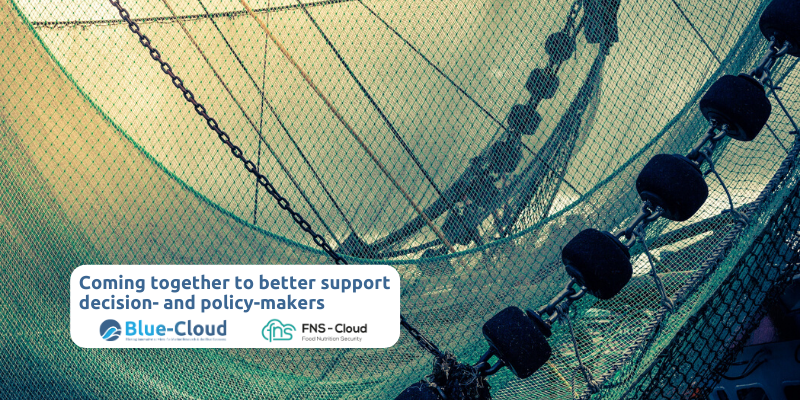Improving food security and nutrition is a key global challenge, as highlighted by the UN Sustainable Development Goal N. 2 and the European Commission, and addressed by public institutions in partnership with the scientific community. Fish and other aquatic products provide significant amounts of food, income, and employment, so to provide data-driven support for decision- and policy-makers in Europe and beyond, Horizon 2020 projects Blue-Cloud and FNS-Cloud launched their collaboration in April 2020, contributing to the understanding of the importance of fish to local and global food systems.
Blue-Cloud is the flagship project of ‘The Future of Seas and Oceans Flagship Initiative’ that will demonstrate the potential of cloud-based open science in the domain of ocean sustainability. It includes a pilot demonstrator for fisheries, “Fish - a matter of scales”, which expands the Global Record of Stocks and Fisheries (GRSF) with more information about the status assessments of stocks and fisheries. Including nutritional data will aid in understanding the dietary value of fish for local communities, often small-scale businesses and their families, and of the contribution of fish to local and national health. Fish provides some 17% of animal proteins consumed by humans but, in coastal communities, this can be much higher. In addition, fish and aquatic products are an important source of micro-nutrients, especially for marginal and vulnerable groups in society, such as infants, pregnant women, and those living with poverty.
The Food and Agriculture Organization of the United Nations (FAO) has decades of experience in sharing food safety data through, for instance, the Codex Alimentarius. FAO has already compiled nutritional values for fish and fish products, which can be used in Blue-Cloud. For example, FAO/INFOODS Global food composition database for fish and shellfish (uFish 1.0 - 2016) and, more generally, INFOODS provide access to detailed food and nutrition data. By connecting data on stocks and fisheries, Blue-Cloud will add a new dimension to understanding the contribution of fish to global food systems. However, these data are not complete, and additional information about food composition can be contributed by FNS-Cloud. Most fish food composition data does not include provenance or management data, which can be important in understanding food systems. The Blue-Cloud GRSF has this information for fish and can inform if seafood from a specific area and stock is sustainable and healthy. For instance, the food composition of wild and farmed salmon is very different; GRSF can make this distinction and adds information on sustainability. Even small changes in nutrient content can have a huge impact on food security amongst marginal groups, where these details become important for health, yet the source of fish and the composition are often overlooked in food-studies.
Integration with the European Open Science Cloud
To bridge this gap in understanding, FNS-Cloud and Blue-Cloud aim to share data between the two projects and with the European Open Science Cloud (EOSC).
Health-related research infrastructures, like ECRIN, ELIXIR, and BBMRI-ERIC, focus on clinical, molecular and biological sciences, whilst existing food, nutrition and security (FNS) resources (data, knowledge rules) are fragmented, lack critical mass, and access by user communities is unevenly distributed. Like Blue-Cloud, FNS-Cloud aims to develop a federated network, supporting access and exploitation of FNS resources, integrated with the EOSC. FNS-Cloud represents the first attempt to link up these resources and provide tools for data management and predictive modelling, advanced methods and Services for user communities. It will make FNS data FAIRer (findable, accessible, interoperable and reusable), adding value to publicly funded research for citizens, and Blue-Cloud will validate some of these FAIR services.
Importantly, however, this collaboration goes beyond common project interests, as both initiatives are piloting models for thematic EOSC clusters. Also, both involve Beneficiaries around Europe that represent the Blue and Food research communities globally. Opinions, consensus and outputs developed through this collaboration will help generate future EOSC data sharing objectives for food and nutrition security and food-system analyses, potentially leading to societal challenges.
If data can be exchanged between FNS-Cloud and Blue-Cloud, and shared beyond with different user communities, this effort will be unparalleled in the evolution of the EOSC seascape and the sustainable provision of FAIRer food data. Success will also pave the way for the implementation of the second phase in FNS-Cloud and the Blue-Cloud Roadmap to 2030, which seeks to develop further uptake and exploitation of these resources globally.
For more information keep an eye on the Blue-Cloud & FNS-Cloud synergy page.
Blue-Cloud has received funding from the European Union's Horizon 2020 programme call BG-07-2019-2020, topic: [A] 2019 - Blue Cloud services, Grant Agreement No. 862409.
Food Nutrition Security Cloud (FNS-Cloud) has received funding from the European Union’s Horizon 2020 Research and Innovation programme (H2020-EU.3.2.2.3. – A sustainable and competitive agri-food industry) under Grant Agreement No. 863059.
